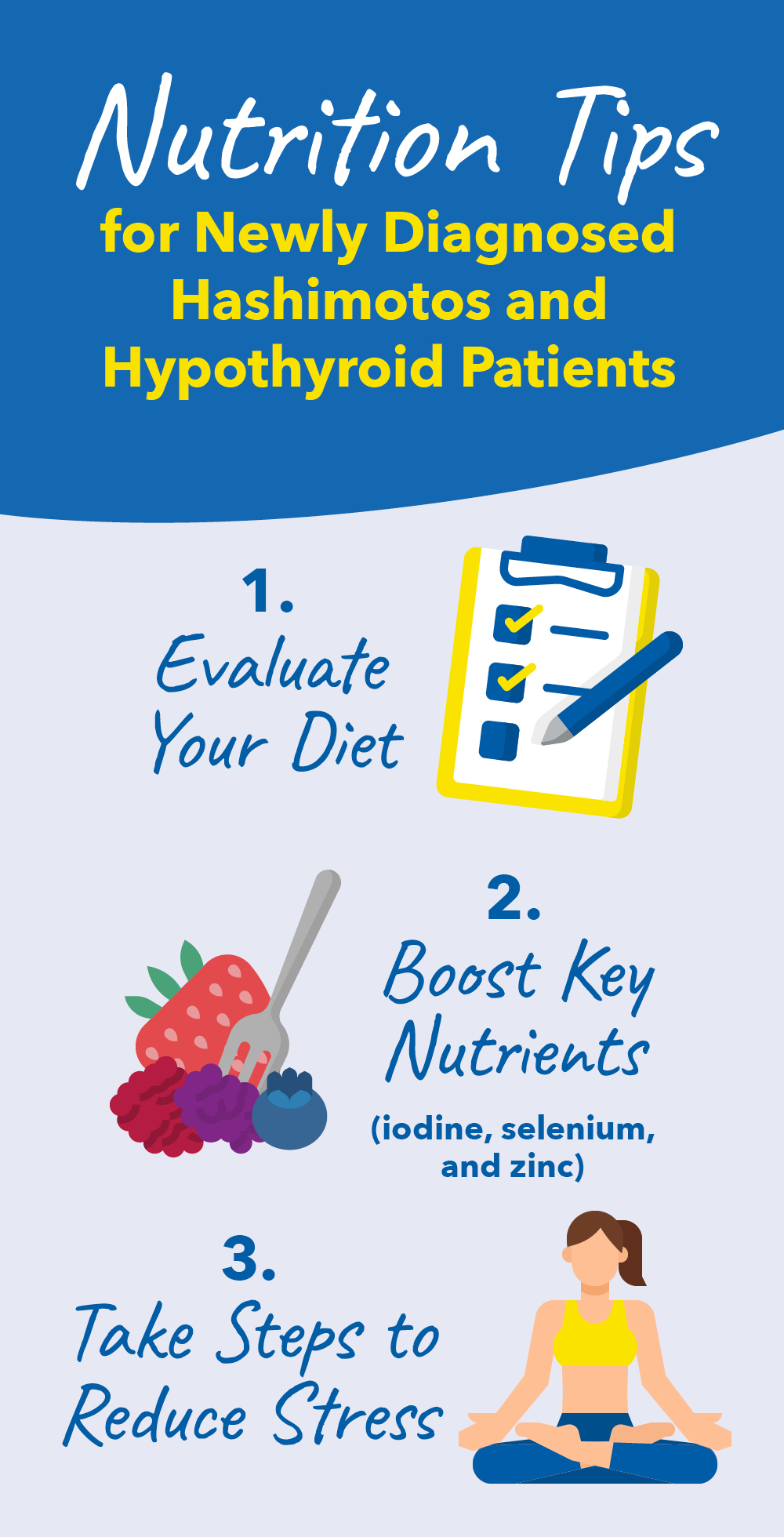Expert Advice

Acella Pharmaceuticals is partnering with Nicole German Morgan, RDN, LD, CLT to bring greater awareness to the importance of thyroid care and education. This post is sponsored by Acella Pharmaceuticals.
Disclaimer: The information provided is for educational purposes only and does not substitute professional medical advice. Consult a medical professional or healthcare provider before beginning any exercise, fitness, diet, or nutrition routine. Acella Pharmaceuticals does not endorse, promote or sponsor any products or brands mentioned in this article. The views expressed here are those of the author.
A new diagnosis of hypothyroidism or Hashimoto’s thyroiditis can create a sense of panic and overwhelming anxiety. There may be a long list of do’s and don’ts that your health care practitioner may provide. The new information might seem a bit too much. But don’t panic! Take the first step to educate yourself and take ownership of your health. This sense of empowerment can go a long way in symptom management. A few dietary and nutrition tips for newly diagnosed can help lay the groundwork for those just starting on their wellness journey.
1. Evaluate Your Diet
The first step in improving your diet for any health or thyroid condition is to take a good analysis of what you currently eat. You cannot correct a diet that you do not know well. Keep a food log for about a week to self-evaluate. This food log can be written down in a journal or in an app-based food log. Either method is fine as long as you are tracking. Most of the time, people discover small areas to improve on and correct to lead toward a healthier diet. Even if you think you know your diet, you will likely learn something valuable. An added benefit is that you will become more mindful about your eating during the period of food logging. Additionally, if you have a weight loss goal, research shows that food logging leads to better success.1
Take Action
Take action on what you discover in your food log. Do you have questions or concerns about your diet after tracking? If so, consider speaking with a registered dietitian who can look at your unique situation and make the best recommendations for you. Have you noticed you are skipping meals? Perhaps try to plan ahead or set timers as reminders. Are you not drinking enough water?
No matter what you discover, it is smart to create one or two small achievable goals for yourself. Next, write down those goals and make that plan. You’ve got this!
2. Boost Your Nutrients
Be cautious of restrictive diets when you are first diagnosed with a thyroid condition. The thyroid needs a certain level of vitamins and minerals daily for optimal function. For example, we understand that for optimal thyroid support, the body needs adequate iodine, selenium, and zinc.2 Many multivitamin supplements have a nice balance of vitamins and minerals; however, not all are created equally, and nutrient levels vary from brand to brand. Therefore, it would be better to ask your health care provider which supplements are right for you.
3. Take One Step to Reduce Stress
This one is easier said than done! However, take it one step at a time to make it something you can accomplish. Excess stress can lead to worsening health and perhaps negatively affect thyroid hormone.3 Stress can come in many forms, such as lack of sleep, work or traffic stress, personal conflicts, extreme dieting, overexercising and more. Determine which stress in your life you can tackle first and do one thing daily that helps reduce this stress. This is another area where keeping a journal and writing your goal for yourself is supportive.
Small Changes
Much of what is discussed in this article is about making small doable changes. Making one change and doing it well is one of the best ways to achieve success in nutrition, and that’s true for thyroid health too. The thyroid can be a sensitive gland, and small positive changes help keep stress at a minimum and your body happy and strong.

REFERENCES: 1. Pourzanjani A, Quisel T, Foschini L. Adherent Use of Digital Health Trackers Is Associated with Weight Loss. PLOS ONE. 2016;11(4):e0152504. doi:10.1371/journal.pone.0152504. 2. Mezzomo TR, Nadal J. Effect of nutrients and dietary substances on thyroid function and hypothyroidism. Demetra: Food, Nutrition & Health. 2016;11(2):427-444. Accessed April 20, 2021. https://go.gale.com/ps/i.do?p=AONE&sw=w&issn=2238913X&v=2.1&it=r&id=GALE%7CA570045942&sid=googleScholar&linkaccess=abs. 3. Cremaschi GA, Gorelik G, Klecha AJ, Lysionek AE, Genaro AM. Chronic stress influences the immune system through the thyroid axis. Life Sciences. 2000;67(26):3171-3179. doi:10.1016/S0024-3205(00)00909-7
Note that DTE products, including NP Thyroid®, have not been reviewed by the FDA for safety or efficacy.
IMPORTANT RISK INFORMATION, INCLUDING BOXED WARNING & INDICATIONS
Important Risk Information
Drugs with thyroid hormone activity, alone or together with other therapeutic agents, have been used for the treatment of obesity. In euthyroid patients, doses within the range of daily hormonal requirements are ineffective for weight reduction. Larger doses may produce serious or even life-threatening manifestations of toxicity, particularly when given in association with sympathomimetic amines such as those used for their anorectic effects.
- NP Thyroid® is contraindicated in patients with uncorrected adrenal insufficiency, untreated thyrotoxicosis, and hypersensitivity to any component of the product.
- In the elderly and in patients with cardiovascular disease, NP Thyroid® should be used with greater caution than younger patients or those without cardiovascular disease.
- Use of NP Thyroid® in patients with diabetes mellitus or adrenal cortical insufficiency may worsen the intensity of their symptoms.
- The therapy of myxedema coma requires simultaneous administration of glucocorticoids.
- Concomitant use of NP Thyroid® with oral anticoagulants alters the sensitivity of oral anticoagulants. Prothrombin time should be closely monitored in thyroid-treated patients on oral anticoagulants.
- In infants, excessive doses of NP Thyroid® may produce craniosynostosis.
- Partial loss of hair may be experienced by children in the first few months of therapy but is usually transient.
- Adverse reactions associated with NP Thyroid® therapy are primarily those of hyperthyroidism due to therapeutic overdosage.
- Many drugs and some laboratory tests may alter the therapeutic response to NP Thyroid ®. In addition, thyroid hormones and thyroid status have varied effects on the pharmacokinetics and actions of other drugs. Administer at least 4 hours before or after drugs that are known to interfere with absorption. Evaluate the need for dose adjustments when regularly administering within one hour of certain foods that may affect absorption.
- NP Thyroid® should not be discontinued during pregnancy, and hypothyroidism diagnosed during pregnancy should be promptly treated.
Indications
NP Thyroid® (thyroid tablets, USP) is a prescription medicine that is used to treat a condition called hypothyroidism from any cause, except for cases of temporary hypothyroidism, which is usually associated with an inflammation of the thyroid (thyroiditis). It is meant to replace or supplement a hormone that is usually made by your thyroid gland.
NP Thyroid® is also used in the treatment and prevention of normal functioning thyroid goiters, such as thyroid nodules, Hashimoto’s thyroiditis, multinodular goiter, and in the management of thyroid cancer.
Revised
10/2023
You Are About To Leave This Website
By clicking continue, this link will take you to a website to which Alora Pharmaceuticals’ Policies & Terms of Use do not apply.
